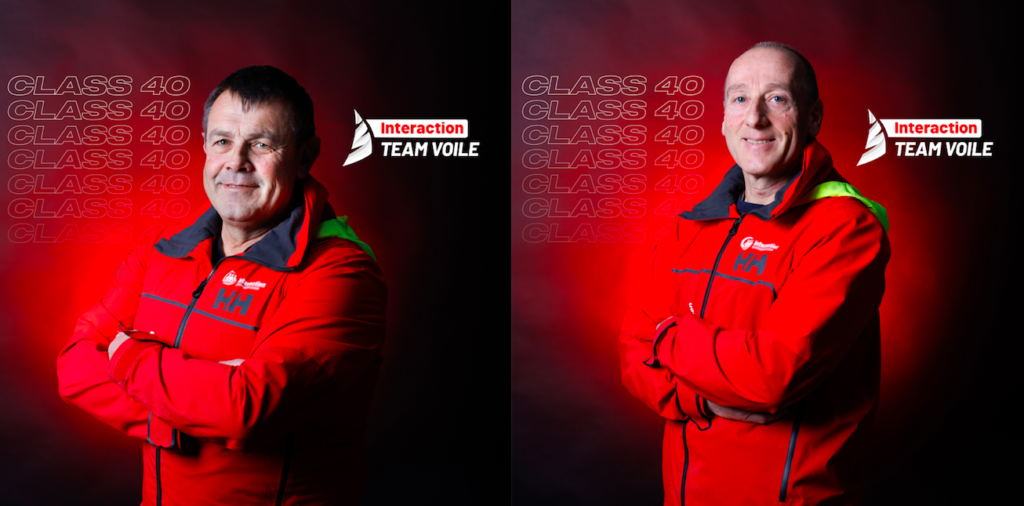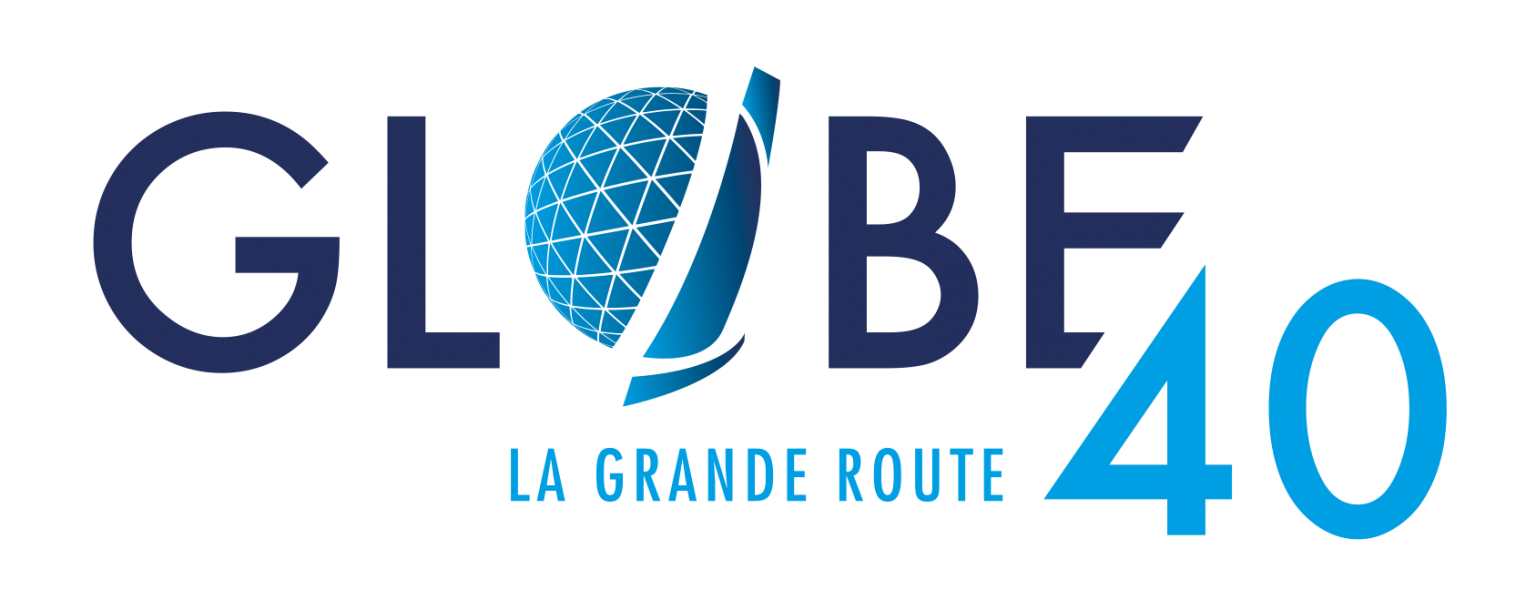
Yannig and Erwan Livory, who are taking part in the 2nd edition of the Globe40 on Class40 n°164 INTERACTION, look back on their respective career and look ahead to the race around the world…
Before looking ahead to your participation in the Globe40 2025, could you look back at your sailing career and past experience, particularly on the Figaro circuit?
Yannig : Like everyone else, I started out racing in the Optimist class before joining the Brest centre for sport and sailing studies for 2 years. It was after those two years that I turned to ocean racing, where I took part in the Tour de France à la voile five times. I then joined the French Soling sailing team for 4 years with a view to the Barcelona Olympics in 1992; it was during this period that I really discovered top-level sport, which was really interesting. The call of ocean racing was there, so I went on to take part in around fifteen transatlantic Figaro races, both single-handed and double-handed. I also took part in 5 Solitaire du Figaro races, a class I chaired for 5 years, notably for the introduction of the Figaro 3. My brother Erwan and I took part in the traditional races on the Figaro circuit.
I followed the finish of the 1st edition of the Globe40 in Lorient and that’s where my idea of one day taking part in this race matured, so here we are today with this great project.
Erwan: Like many people, I sailed with Yannig and my parents when I was young, cruising from the age of 3-4 on a Corsaire built by my father. Unlike Yannig, I didn’t follow a competitive sailing career; I did a lot of competitive gymnastics for almost 20 years. However, I’ve never stopped sailing. When Yannig embarked on his Figaro seasons, I was in the background managing the project, looking for partners, convoying and training. That’s when we started sailing together again. In 2006, he suggested we do the Transat AG2R together and that’s when I started racing again. I wasn’t really keen on solo racing, so we focused our programme with Yannig on solo races and with me on double-handed races on the Figaro circuit.
You’ve been supported by your partner INTERACTION for many years. How did the INTERACTION TEAM VOILE project come about?
Yannig: It was a completely chance meeting, not at all in the sailing world. We’d been invited to the Vieilles Charrues Festival and it just so happened that the boss of Interaction was sitting at our table. That’s where the story with Interaction began. The partnership developed gradually, starting with the Figaro and now the Class40. We’ve been together for 7 years now.
Erwan: While we were looking for partners, we were lucky enough to meet the management team of Interaction, who put their trust in us and who have become the main partner in our project over the years. A year ago, we added to the Interaction project by setting up Interaction Team Voile, at which point Interaction’s management entrusted us with managing the technical, financial and sailing aspects of Interaction Team Voile. This enabled us to bring gender diversity and youth into the project, particularly by including female crew members in the crewed races. That’s when Louise Comont joined the Mini 6.50 team. She will be working alongside us in the Class40 crewed races, including the Niji 40.
You’ve bought the latest generation boat, Class40 no. 164. What are your first impressions on the boat?
Yannig: It’s not exactly the latest generation Class40, as there are some that have come out of the yard since then, but I really wanted this boat because it wasn’t too extreme compared to the latest Scows. What’s more, the boat was ready to sail with no refit required. It’s a powerful boat where everything is heavier to handle. Apart from that, it’s not very complicated to handle, it’s still a boat! The maintenance and preparation of the boat remains important and that’s why it was important for us to acquire this boat quickly so that we have time to prepare well for the Globe40.
Erwan : Class40 is a really interesting follow-up to the Figaro years. It’s clear that we’ve reached a new level in every respect. They’re very technical boats because they’re necessarily bigger, so the shore preparation part is more important. This new project is giving us a boost, allowing us to question ourselves and avoid settling into a routine. And then at sea, it’s a joy! It’s great because it goes faster, it’s bigger, there’s more tension, there are new things to put in place. New things mean we have to progress and question ourselves, and that’s what makes the project so interesting. Another important point is that joining Class40, which is made up of professionals and experienced amateurs like us, has enabled us to rediscover a mix and openness, which makes the project very enjoyable.
Let’s talk about the Globe40, where you’ve entered the 2nd edition. How did you come up with the idea of taking part in this round-the-world race?
Yannig : When you start ocean racing, it’s pretty much everyone’s dream to one day sail around the world. This concept of racing suits Erwan and me very well, because as we both work on the side, this project remains fairly simple to manage compared with Imoca projects, for example. We’re convinced that there’s a great story to be told around this race around the world and that’s what we’ve told to our partner. The Globe40 combines competition and adventure. Between the projects entered and the people who are keen to sign up, the race promises to be exciting. And then there’s the adventure side, with new countries and cultures to discover. It’s a good mix for us, and the Globe40 is going to be a real treat.
Erwan : The idea came gradually. We wanted to change class, not necessarily with a precise programme, but we had the opportunity to propose this project to our partner. We thought it would be a great adventure. We’re amateurs but we’re still competitors with a desire to do well, to do well in the races, but the idea is really to be able to tell a story around this Interaction Voile project; if our sailing has no meaning it will have little value for us and our partner. A podium finish is fine, but telling a story is the most important thing for us. The Globe40 gives us the time to do that with the preparation of the project and the length of the race. It’s an international race, so it’s going to have a lot of resonance within Interaction. And on a human level, it’s the project of a lifetime, so having the chance to race around the world is an opportunity we can’t wait to seize.
The fact that you’re associated with your brother must help you in the management of such a project? How do you organise the preparation of the boat and the distribution of roles on board?
Erwan : We’ve been used to managing the project together for a long time now. It’s true that our proximity helps us enormously in managing the project. To tell you the truth, we live less than 500m from each other, so it’s a lot easier to plan things, get together and talk things over. I deal more with the planning and financial aspects of the project, while Yannick, with his naval architecture background, concentrates more on the technical choices. As for the sporting side and physical preparation, I’m the one who takes the lead on that, bearing in mind that my basic training is in sports physiology and bio-mechanics. When it comes to sailing, I’m more in charge of manoeuvres, while Yannig is more at the helm at the piano. And to finish off on the strategy and weather part, we exchange ideas together but Yannig remains the skipper of the boat and so it’s he who will make the final decisions.
How far have you got in preparing for this project? What is your sporting programme up to the start of the Globe40 in 2025?
Yannig : We’ve carried out an initial refit to get to grips with the boat. We’re going to take part in the Niji 40 and come back on a delivery trip to get a better idea of what needs to be done to the boat afterwards – it’s by sailing that we’ll get a better idea of things. Over the summer, we plan to work on the boat again with a view to the Globe40, with some bulkheads to be added and work to be done on the mast. This period will be an important phase in the project, the aim being to be ready by the end of 2024 so that we can set off with peace of mind for the Globe40 in 2025.
Erwan : So we’ve bought Class40 n°164 and she’s based in Lorient. After the first few sailings to get to grips with her, we’ve done a little refit and the boat should be back in the water this weekend so we can start sailing again quickly to get ready for the start of the Niji 40, which will be the first transatlantic race for us on this boat. On our return from the delivery trip, we’ll be doing some PR with our partners before concentrating on the refit before the start of the Globe40.
I imagine that you followed the 1st edition closely. What do you remember about this race and what was the most memorable moment for you?
Yannig: I think the welcome we received on the different legs was a highlight. For our part, we really want to work on the communication aspect and be able to transmit images from the sea to share life on board and really share what we’re experiencing.
Erwan: It’s a long-drawn-out race that shouldn’t be seen as a sprint. You have to prepare the boat and the crew for a round the world and not necessarily think that you have to set off in a sprint that will last 3 weeks. The race will be really long and it’s essential to take that into account when preparing for the round the world.
I think that the arrival of the 1st edition in Lorient was a great moment, it marked the end of a great adventure for all the sailors involved.
What are your goals and ambitions for the Globe40?
Yannig: The first objective is to set off and arrive! Setting off with a ready boat is going to take time and a lot of anticipation. We want to anticipate all the technical problems before we set off so that we have as few things as possible to discover during the race.
The second objective will be to manage the race well and preserve the equipment. Globe40 is a long race, so we’re going to have to set the cursor at the right level to have as few technical problems as possible so that we can take it step by step. That’s more or less our philosophy, and from there the results will follow. We want to share our adventure as much as possible.
Erwan: As Yannig said, the first objective is to be at the start and the second is to be at the finish! Being at the start will mean that we’ve succeeded in making the boat reliable and that we’ll still have the confidence of our partner, although I don’t doubt that, and it’s important to stress that. It will also mean that we’ve personally managed to organise these eight months, because in terms of work, it means a long absence and that’s no mean feat.
Reaching the finish will mean that you’ve prepared well, that you’ve gone all the way in this adventure, that you’ve been careful enough to finish and that there haven’t been any major material breakages.
In between, we’ll do the best we can, we’ll fight hard and above all we’ll try to tell a great story with the people who are with us!
I’ve got a bit of an image of a caravan that’s going to travel around the world and that there are going to be some wonderful human encounters during the stages. I’m really looking forward to this adventure!

